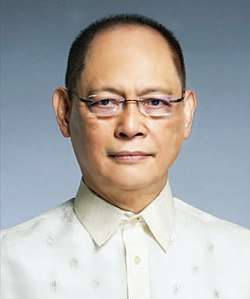Benjamin Diokno
| Benjamin Diokno | |
|---|---|
 | |
| Secretary of Budget and Management | |
|
Assumed office June 30, 2016 | |
| President | Rodrigo Duterte |
| Preceded by | Florencio Abad |
|
In office June 30, 1998 – January 20, 2001 | |
| President | Joseph Estrada |
| Preceded by | Salvador Enriquez Jr. |
| Succeeded by | Emilia Boncodin |
| Personal details | |
| Born |
Benjamin Estoista Diokno March 31, 1948 Taal, Batangas, Philippines |
| Nationality | Filipino |
| Children |
Charlotte Justine Diokno-Sicat Benjamin G. Diokno Jr. Jonathan Neil G. Diokno |
| Residence | Quezon City, Metro Manila |
| Alma mater |
Syracuse University Johns Hopkins University University of the Philippines Diliman |
| Occupation | Economist, public servant, university professor |
Benjamin Estoista Diokno (born March 31, 1948) is the current Secretary of Budget and Management of the Philippines under the administration of President Rodrigo Duterte.[1] He held the same position under President Joseph Estrada, from July 1998 until Estrada's ouster in January 2001.[2][3] Diokno also served as Undersecretary for Budget Operations at the Department of Budget and Management, from 1986 to 1991, during the administration of President Corazon Aquino.[4]
During the Aquino administration, Diokno provided technical assistance to several major reforms such as the design of the 1986 Tax Reform Program,[5] which simplified income tax and introduced the value-added tax (VAT), and the 1991 Local Government Code of the Philippines.[6]
During the Estrada administration, Diokno initiated and instituted several reforms that would enhance transparency and improve the efficiency of the delivery of government services. The first major reform instituted was the "what you see is what you get" or WYSWIG policy that is a simplified system of fund release for the General Appropriations Act (GAA). This allowed agency heads to immediately plan and contract out projects by just looking at the GAA, which is available in print and at the DBM website, without waiting for the issuance of an allotment authority.[7] Diokno initiated the reform of the government procurement system (GPS) through the adoption of rapidly improving information and communications technology. He secured technical assistance from the Canadian International Development Agency (CIDA) to help the GPS develop an electronic procurement system along the lines of the Canadian model. By August 1999, the DBM had two documents necessary to initiate reforms in public procurement. In early 2000, Diokno and USAID successfully concluded a substantial technical assistance program for the DBM's budget reform programs, which now included procurement reform.[8] Other budget reforms instituted by Diokno concerned procedures for payment of accounts payable and terminal leave/ retirement gratuity benefits. The release of cash allocation were programmed and uploaded to the department's website while payments were made direct to the bank accounts of specific contractor.[7]
Diokno finished his bachelor's degree in Public Administration from the University of the Philippines (1968), and earned his master's degree in Public Administration (1970) and Economics (1974) from the same university. He also holds a Master of Arts in Political Economy (1976) from the Johns Hopkins University in Baltimore, Maryland, USA and a Ph.D. in Economics (1981) from the Maxwell School of Citizenship and Public Affairs, Syracuse University in Syracuse, New York, USA.
He is Professor Emeritus of the School of Economics of the University of the Philippines-Diliman.
He served as Fiscal Adviser to the Philippine Senate. He also served as Chairman and CEO of the Philippine National Oil Company (PNOC) and Chairman of the Local Water Utilities Administration. He was also Chairman of the Board of Trustees of the Pamantasan ng Lungsod ng Maynila (City University of Manila).
In his third tour of duty as Budget Secretary, he intends to pursue an expansionary fiscal policy to finance investments in human capital development and public infrastructure. In addition, he seeks for the passage of a Budget Reform Bill to ensure the compliance of future budgets with the pertinent laws of the land. He also aims to re-organize and professionalize the bureaucracy with a Government Rightsizing Act.
He writes a column for BusinessWorld,[9] Southeast Asia’s first daily business newspaper.
References
- ↑ "Estrada-era Budget Sec. Diokno accepts Duterte offer to return to post". GMA Network News. 31 May 2016. Retrieved 31 May 2016.
- ↑ Diokno says rice smuggling not all that bad, ABS-CBN News, April 13, 2008
- ↑ Benjamin Diokno curriculum vitae Archived October 9, 2006, at the Wayback Machine.
- ↑ Managing the Politics of Reform - ISBN 0-8213-6435-9 Archived June 9, 2007, at the Wayback Machine.
- ↑ University of the Philippines Discussion Paper No. 0502
- ↑ Republic Act No. 7160
- 1 2 Department of Budget and Management
- ↑ Campos & Syquia. 2006. Managing the Politics of Reform: Overhauling the Legal Infrastructure of Public Procurement in the Philippines. World Bank Working Paper No. 70
- ↑ BusinessWorld Online: Core - By Benjamin E. Diokno: "Doubting investors"
External links
| Political offices | ||
|---|---|---|
| Preceded by Salvador Enriquez Jr. |
Secretary of Budget and Management 1998–2001 |
Succeeded by Emilia Boncodin |
| Preceded by Florencio Abad |
Secretary of Budget and Management 2016–present |
Incumbent |
| Order of precedence | ||
| Preceded by Fortunato dela Peña as Secretary of Science and Technology |
Order of Precedence of the Philippines as Secretary of Budget and Management |
Succeeded by Alfonso Cusi as Secretary of Energy |